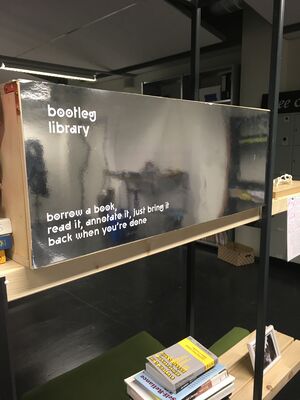User:Simon/bootleg library
the bootleg library
The bootleg library is a particular, situated social infrastructure. It operates from the understanding that a library is a collection; the texts contained within, and the readers collected around them.
instances
the physical bootleg library
The physical bootleg library is a collection of bootlegged books, contained within a disused champagne crate. Similar to a "mini-bieb" which are public library boxes installed in neighbourhoods, books within are not catalogued and it is open for anyone to borrow books. Books in the physical library are also permitted to be annotated. The only condition is that they are returned. The physical library is also mobile, and portable, travelling to different bootleg library sessions.
the digital bootleg library
The digital bootleg library runs on the software calibre-web from a Raspberry Pi4. It is available at the following URL:
hub.xpub.nl/bootleglibrary
Users who know the HTTP login can use the guest account to upload/download books and edit metadata. Users with a registered account can create and edit public and private shelves, which are ways to collectively, or individually organise the collection.
activities
There are three main activities;
1) bootlegging, republishing and distributing printed books
Each book is printed and bound in an edition of one. Bootlegging happens on a case-by-case basis; by myself, for others, and with others, depending on individual demands. These bootlegged books are contained in the physical bootleg library.
2) conducting bootleg library sessions in various locations
bootleg library sessions are moments for readers to collect together around texts. Each session is loosely organised, and readers are invited to stay as long as they like. Sessions are open to everyone, and the conversation often drifts. What is important is the texts that are produced in these sessions (see below).
3) producing texts
This activity happens as the result of both the first two activities. Texts are printed and bound when bootlegging. Texts are written on index cards, in collaborative writing environments such as Etherpad, in the metadata of the digital library when users are registered and books are uploaded, and in the various conversations that happen in each bootleg library session, which happens in different places, with different publics.

